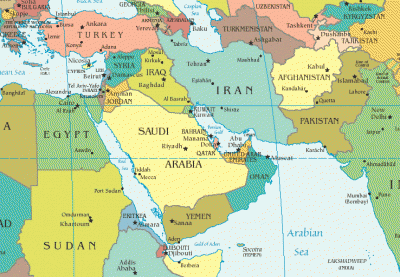Diplomatic Crisis in the Middle East: The Ingredients for a Catastrophe in the Making

The ingredients for a catastrophe in the making are being mixed in a minute-to-minute unfurling global crisis before our very eyes. It sounds like a bad film plot — but that will come later. This is real. Handled well it will be diplomacy at its best; at its worst, there could well be another war. The protests of Sept. 11 and Sept. 12 in Libya and Egypt — ostensibly over a cheap poorly-acted computer-generated mash-up of a film — illustrate the need for caution in jumping to face-value conclusions more than ever. Within one day of the initial attacks on US embassies, riots had spread to Yemen, Bangladesh, Iran, Afghanistan, Morocco, Sudan, Pakistan, Somalia and Tunisia. By the time this goes to print, they will have spread farther, fast-moving torrents of anger pouring over the Arab world.
But why are these events happening now? There are multiple elements at play: Political one-upmanship, an incendiary film, a fake identity; Jewish blame, Christian responsibility, Salafis, Al-Qaeda and the Muslim Brotherhood; drugs, fraud and prison; drones, destroyers and missiles; defense spending, sequestration and voter promises; neoconservatives, and Egypt the prize.
This summer, Al-Qaeda’s second-in-command Abu Yahya Al-Libi from, of course, Libya, was killed by a drone strike in Pakistan on June 5. The following day, his supporters in Libya launched an IED attack on the US Consulate in Benghazi, filmed the fire damage and uploaded their video to YouTube. On Sept. 11, Ayman Al-Zawahiri, Al-Qaeda’s No. 1, released a 42-minute video calling for attacks on Americans over the death of Al-Libi, clinging to a pretence of a strength amongst the remnants of Al-Qaeda. Fewer than 50 exist according to Leon Panetta, Secretary of Defense, but inflating membership serves both Al-Zawahiri and the United States and keeps the narrative of the power of Al-Qaeda to the fore. Al-Zawahiri has none of the recruitment skills of Osama bin Laden, and needs to perform like a leader in control of many; the United States must also maintain the image of hundreds of Al-Qaeda terrorists scattered worldwide and behind every action of violence in order to justify military intervention.
This week, President Obama signed the September 14th renewal of the Authorization for the Use of Military Force Against Terrorists (AUMF), the only Congressional resolution passed relating to intervention in Afghanistan in 2001. Only by an Act of Congress can the US declare war.
Yet, for neither Afghanistan nor Iraq (agreed upon via the Authorization for Use of Military Force Against Iraq Resolution of 2002) was any such declaration ever made. War has not been declared officially by the United States since 1941. The AUMF did not specify Afghanistan — or any state — by name. The target of military force therefore remains open-ended, arbitrarily applicable in the use of “all necessary and appropriate force against those nations, organizations, or persons” the president deems as connected in any way with Sept. 11 2001, in the planning of present or future attacks.
In other words, anyone, anywhere, at any time who ever threatens Americans are subject to military retaliation by force. That permits the president of the US an enormous amount of latitude as long as Al-Qaeda terrorists are consistently identified as the perpetrators of violence. If there are so few left they appear to have tentacles, are multiplying, and — like mercury — smash the center and out pop another 20 cells.
Furthermore, as of the beginning of January 2013, the Pentagon is facing forced automatic defense spending cuts of $ 500 billion over the course of the next nine years. Since 9/11, defense spending has become a litmus test of American patriotism, and neither the Republicans nor the Democrats are prepared to anger their voting base. Republicans believe that defense spending should increase to forever protect the United States from any potential harm; the Democrats fear losing more voters by defense-industry job losses. In an election season, it’s a risky issue: Almost every state in the US has an element of the Military Industrial Complex manufacturing industry at stake, by design. Excluding war costs, the military budget has ballooned by 50 percent over the past decade, and should the triggered cuts take place the Pentagon’s base budget will revert to 2007 levels of spending.
But there is a loophole to sequestration, built in to the original agreement. All the automatic triggers fly out the window if the US finds another reason to go to war, and then the Pentagon can go on a shopping spree.
The Cairo protests were, and remain, dominated by genuinely angry men and women, incensed by this obscure film’s depiction of the Prophet Muhammad. On Sept. 11, three thousand men and women, football fans and orthodox Muslims alike gathered in protest, and some began to scramble across the walls of the embassy. The crowd called the police over to intervene and stop some men climbing onto sovereign territory but they did little to respond until witnesses screamed for them to act. By then the American flag had been torn down and the new symbol of anti-Americanism — the black flag with the shahada upon it — was already hoisted in its place. Graffiti was sprayed hastily upon the walls, with religious statements (“United States of Islam”) as well as implied threats (“Take care America, we have 1.5 billion bin Ladens”). Most of the demonstrators made clear they did not support Al-Qaeda or terrorism, and the black flag does not represent such: It has instead become a symbol of ever-increasing hostility toward the United States and its years of intervention in Muslim states. Instead this was more of an opportunity to act out against America overseas by agitating outside its Embassy. “Salafis” though, has become part of the mainstream media, the new buzzword to describe any Arab male incensed when his religion is defamed.
But their message was clear. The president of the United States should take action against the makers of the film if these responses were to stop. The public viewed the existence of the video as yet another anti-Muslim atrocity in the same vein as so many seen during the years of troops in Afghanistan and Iraq.
Egyptian President Mursi telephoned President Obama and “in the clearest terms” condemned the security breach. “I called him to ask him to put an end to such behavior,” Mursi said in regards the now-viral video, and “I assured Barack Obama that we will not permit any attacks” on US diplomatic compounds across Egypt.
The night before, staffers at the Cairo embassy had issued a statement urging “misguided individuals” to stop these continued provocations against Muslims. In his quest to trump the president in this election year, Republican candidate Mitt Romney raced to e-mail reporters with a statement, reaching them one minute after Hillary Clinton contacted the press and explicitly condemned the violence still ongoing in Libya, confirming one death and expressing condolences.
Romney, however, managed to act like never before seen during a foreign policy crisis. “It’s disgraceful that the Obama administration’s first response was not to condemn attacks on our diplomatic missions,” Romney slandered.
He not only falsely attacked President Obama for “apologizing” and “sympathizing with those who waged the attacks”, but insulted the embassy personnel for having urged calm in the first place. The chairman of the Republican National Committee, Reince Priebus, then followed suit on Twitter stating, “Obama sympathizes with attackers in Egypt. Sad and pathetic.” It was a pitiful attempt to score political points, and may well have cost Romney the presidency in November.
Molded by the Bush-era neoconservatives, Romney has been told how to shape his foreign policy. He repeats the “attack on Americans” refrain at every chance, perfectly in keeping with the Authorization allowing for military force anywhere in the world, against any American attacked by hostile elements. Whether Democrat or Republican, as long as there are “attacks on Americans,” the “War on Terror” would by definition be never-ending.
Mitt Romney did not back down, and continued his critiques the following morning. By this time, there had been four deaths at the embassy in Libya, and Romney took advantage to keep on digging.
The hostile rhetoric, however, was not confined to just the Republican nominee.
On Tuesday night, in an interview for Telemundo television, President Obama changed the history of foreign relations with Egypt with one short sentence, overturning decades of hard-fought diplomatic efforts.
In a shocking departure from policy he stated that although Egypt’s government wasn’t “an enemy,” it was not a friend. “I don’t think that we would consider them an ally,” he said. Egypt was on the radar.
Back in August 2002, neoconservative provocateur Laurent Murawiec (now deceased) presented a paper to the US Department of Defense’s Defense Policy Board Advisory Committee, dominated by fellow neoconservatives. Entitled “Expel Saudis from Arabia”, Murawiec included a 24-page PowerPoint presentation to press his point. The last slide in the PPT was captioned “Grand Strategy for the Middle East” and included three goals: “Iraq is the tactical pivot”; “Saudi Arabia the strategic pivot;” and “Egypt the prize”.
The strategic goal was simple: Take down Saddam Hussein, weaken Hezbollah and Syria, and tarnish Saudi Arabia. Egypt had to come last: Its mass, history, prestige and potential were, Muraweic explained to the officials in attendance, “where the future of the Arab world will be decided. Egypt, then, in the new Middle Eastern environment created by our war, can start being reshaped.”
That was 10 years ago.
A day after the Embassy attacks, Zbigniew Brzezinski, National Security Adviser to President Jimmy Carter during the USSR-Afghan War, and past foreign policy adviser to President Obama, spoke out against Mitt Romney’s neoconservative advisers. He suggested that Romney ought to rely instead on his more qualified adviser: Robert Zoellick. Author of The Grand Chessboard, Brzezinski also argues for a reshaping of the region, no challengers to American hegemony in Eurasia.
And who is this Robert Zoellick that Brzezinski admires? He is the hard-right neoconservative Bush administration Deputy Secretary of State, and current head of the World Bank who — as a member of the Project for the New American Century (PNAC) — pushed, and got, a war in the Middle East in part to ouster Saddam Hussein. Little different, in other words, to Brzezinski’s world vision.
Post the Iraq War, events have not quite gone according to expectations. The “Arab Spring” turned into summer and then autumn and winter, and more than a year later Syria is still in flames in a civil war with no end in sight.
Remarkably, instead of strategic planning or interference, a silly little film that appears as though made on a budget of less than $100 has sparked the new rage. The men behind the movie deserve further examination. The video was not responsible, however, for the well-organized rocket-propelled attacks upon the US Consulate in Libya.
Things are not what they seem, and diplomatic sands are shifting as fast as a haboob.
(This is the first of a two-part column on diplomatic crisis in the Middle East.)
Tanya Cariina Hsu is a British political analyst specializing in US-Saudi foreign policy.
* * *
Order Directly from Global Research


